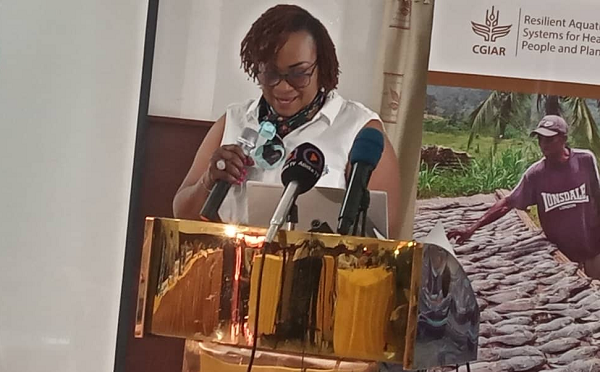
Invest in aquatic food system research - Dr Cofie to govt
The Country Representative of International Water Management Institute (IWMI) in Ghana, Dr Olufunke Cofie, says investing in effective resilient aquatic food systems, informed by research, can help address Ghana’s nutrition needs.
She was of the view that investing in effective resilient aquatic food systems informed by research would help to eliminate the threats of key systemic challenges facing the sector and could offer transition pathways to a more just, nutritious, healthier, lower-carbon and climate-resilient food system.
Advertisement
She said aquatic foods are an important and growing component of the global food system and provide diverse benefits.
Dr Cofie made the remarks in an interview with Graphic Online on the sidelines of the launch of the “Resilient Aquatic Food Systems” initiative in Accra early this month.
The initiative is aimed at contributing to the country’s food security as well as its developmental agenda, with the initiative proposing the integration of aquatic production into water resources management plans to support the country’s food production systems.
The initiative was conceived and designed by the Consultative Group on International Agricultural Research (CGAIR) to expand smallholder productivity, increasing nutritional outcomes and offering opportunities to benefit from fish value chain, specifically for women and youths.
The Resilient Aquatic Food Systems initiative would be jointly implemented by CGAUIR, IWMI, Fisheries Commission, CSIR, MOFAD, Northern Development Authority and District Assemblies.
Dr Cofie explained that three-year term project was introduced to support ongoing government programmes to build a resilient aquatic food systems in the country.
“We are working together with our other CGIAR centres to ensure that we have the right data, addressing the problems that are constraining the productivity for the right decision to be made in the implementation process," she noted.
She added that the government had already rolled out initiatives so they were coming in as a knowledge institute to assist such initiatives, saying “We want to support by ensuring that we are able to build a resilient aquatic food system in Ghana.”
DrCofie further hinted that IWMI would work jointly with the local partners to co-design the innovative packages that would facilitate the successful implementation of the project outcomes.
The Resilient Aquatic Food Systems” initiative is currently being implemented in Bangladesh, Cambodia, India, Kenya, Malawi, Myanmar, Nigeria, Solomon Islands, Timor Leste and Zambia.
The project is expected to ensure that about four million people in target countries met their smallest micronutrient requirements.
The Minister of Fisheries and Aquaculture Development (MOFAD), Mrs Mavis Hawa Koomson, who launched the initiative, said the project was in line with the Ministry’s Medium Term Development Plan (MTDP) and the Aquaculture for Food and Jobs project.
For her, the Ministry would give the project the needed support to ensure that it achieved its set objectives, saying “Ghana has climatic conditions that are favourable to aquatic food production and the development or enhancement of multifunctional agricultural landscapes.”
She added, “Ghana is blessed with large freshwater bodies and large swathes of estuarine, coastal and saline floodplains suitable for aquaculture.”
The Fisheries Minister said, "It is worthy of note that the programme would collaborate with the Fisheries Commission and the Council for Scientific and Industrial Research (CSIR) to co-design innovative packages that allows the integration of aquaculture into small water infrastructures within the existing framework of One Village One Dam strategy implementation."



